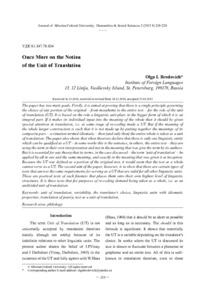Once More on the Notion of the Unit of Translation
Скачать файл:
URI (для ссылок/цитирований):
https://elib.sfu-kras.ru/handle/2311/16669Автор:
Brodovich, Olga I.
Бродович, О.И.
Дата:
2015-02Аннотация:
The paper has two main goals. Firstly, it is aimed at proving that there is a single principle governing
the choice of any portion of the original – from morpheme to the entire text – for the role of the unit
of translation (UT). It is based on the role a linguistic unit plays in the bigger form of which it is an
integral part. If it makes its individual input into the meaning of the whole then it should be given
special attention in translation, i.e. at some stage of re-coding made a UT. But if the meaning of
the whole larger construction is such that it is not made up by putting together the meanings of its
composite pars – a situation termed idiomatic – then (and only then) the entire whole is taken as a unit
of translation. The paper also shows that when theorists declare that there is only one linguistic entity
which can be qualified as a UT – in some works this is the sentence, in others, the entire text – they are
using the term in their own interpretation and not in the meaning that was give the term by its authors.
But it is essential for any theory that its terms, in the case discussed – the term ‘unit of translation’ – be
applied by all in one and the same meaning, and exactly in the meaning that was given it at inception.
Because the UT was defined as a portion of the original text, it would seem that the text as a whole
cannot serve as a UT. The second aim of the paper, however, is to show that there are certain types of
texts that answer the same requirements for serving as a UT that are valid for all other linguistic units.
These are poetical texts of such fineness that places them onto their own highest level of linguistic
structures. It is these texts that for purposes of re-coding demand being taken as a whole, i.e. as an
undivided unit of translation В статье рассматривается вопрос о принципе, на котором основывается выбор единицы
перевода. Показывается, что ключевым в этом вопросе является наличие/отсутствие
идиоматичности в отношениях между единицей того или иного уровня языковой структуры
и той большей структурой, в которую рассматриваемая единица входит как составная
часть. Если семантика более крупной структуры составляется из суммы смыслов
образующих ее частей, то каждая такая часть подлежит отдельному отражению в
переводе, то есть становится самостоятельной единицей перевода. Если же семантика
включающей структуры оказывается чем-то бóльшим, чем простая сумма смыслов частей,
то переводу подлежит именно эта включающая структура как единое целое. Существенно,
что это оказывается справедливым для единиц всех знаковых уровней – от морфемы в
составе слова до целого предложения. Особое внимание уделено возможности признания
текста как единицы, подлежащей цельному переводческому решению. Показано, что и к
тексту применимы те же критерии, которые определяют выбор менее крупных единиц
перевода. Показано также, что текстами, которые могут и даже должны быть взяты
как целое для перевода, являются поэтические тексты, но не любые, а лишь те, которые по
своему значению являются чем-то качественно бóльшим, чем сумма смыслов составляющих
их предложений
Коллекции:
Метаданные:
Показать полную информациюСвязанные материалы
Показаны похожие ресурсы по названию, автору или тематике.
-
The Image of Russian Language and Literature in M. Shishkin’s Story “Calligraphy Lesson”: Object and Unit of Translation
Razumovskaya, Veronica A.; Разумовская, В.А. (Сибирский федеральный университет. Siberian Federal University, 2017-03)The article explores methodological (hermeneutical) problems of reconstruction of the information complex and unique linguocultural parameters of M. Shishkin’s “Calligraphy Lesson” within the interlinguistic translation. ... -
Tackling the Problem of Translation of Turkish Phonetically Motivated Units
Bartashova, Olga A.; Krasnova, Anna V.; Барташова, О.А.; Краснова, А.В. (Сибирский федеральный университет. Siberian Federal University., 2015-02)The article is dedicated to the problem of Turkish-English phonosemantic parallels from the point of translation. In past researches were likely to view iconic units as untranslatable ones, which led to a variety of ... -
The Dictates of the Market The Future of Profession of Translators and Interpreters in a Post-Socialist EU-Member State
Pokorn, Nike K.; Покорн, Нике К. (Сибирский федеральный университет. Siberian Federal University., 2016-03)The article outlines the changes of the profession of translators and interpreters, and the development of the translator and interpreter training at the university level in the Republic of Slovenia, one of the post-socialist ... -
Дело Калипари: махинации политиков и манипуляции журналистов
Федеричи, Ф.М.; Federici, Federico M. (Сибирский федеральный университет. Siberian Federal University., 2011-10)В данной статье рассматривается case-study, изучающее отношение итальянской прессы к некоторым переводным источникам. Исследуются вопросы перевода, связанные с языковыми средствами манипулирования и затронутые журналистами ... -
От иностранного языка к переводу, или Via Scientiarum
Кононова, В.А.; Kononova, Valentina A. (Сибирский федеральный университет. Siberian Federal University., 2011-10)В статье рассматриваются некоторые аспекты преподавания перевода в университете в парадигме личностно ориентированного образования, а именно: роли преподавателя- переводчика и студента, переводческие стратегии. К обсуждению ...

